Research indicates brain tumors can impact behavior, potentially leading to traits resembling Narcissistic Personality Disorder (NPD). Tumors disrupt cognitive functions, affecting empathy and decision-making. Changes in behavior, such as heightened impulsivity or reduced empathy, can emerge based on tumor size and location. Understanding these alterations is important for accurate diagnosis and personalized interventions. Tumors in areas like the frontal lobe or insular region can exacerbate existing narcissistic traits or mask symptoms of NPD. Recognizing the influence of tumors on behavior is essential for tailored treatment approaches. Insights into this complex relationship can enhance diagnostic precision and therapeutic effectiveness.
Key Takeaways
- Brain tumors can exacerbate narcissistic traits like lack of empathy.
- Tumors in specific brain regions impact emotional processing and social interactions.
- Research gaps exist in understanding the connection between brain tumors and NPD.
- Changes in behavior due to tumors may resemble narcissistic characteristics.
- Understanding tumor-induced personality changes aids in accurate diagnosis and treatment.
Brain Tumors and Personality Disorders
In exploring the connection between brain tumors and personality disorders, researchers have uncovered potential links to changes in behavior, particularly traits associated with narcissistic personality disorder. Studies indicate that brain tumors can impact brain regions responsible for emotional regulation and empathy, potentially leading to alterations in personality.
It's intriguing to note cases where individuals with brain tumors exhibited behaviors resembling narcissistic traits following surgery or treatment. The influence of brain tumors on cognitive functions and personality may contribute to the development or exacerbation of symptoms related to narcissistic personality disorder.
This understanding is important in the fields of neurology and psychology, where ongoing research seeks to unravel the intricate relationship between brain tumors and personality changes, particularly those linked to narcissistic traits. By delving into these connections, we aim to gain insights that could enhance diagnostic and therapeutic approaches for individuals facing such challenges.
Impact of Tumors on Behavior
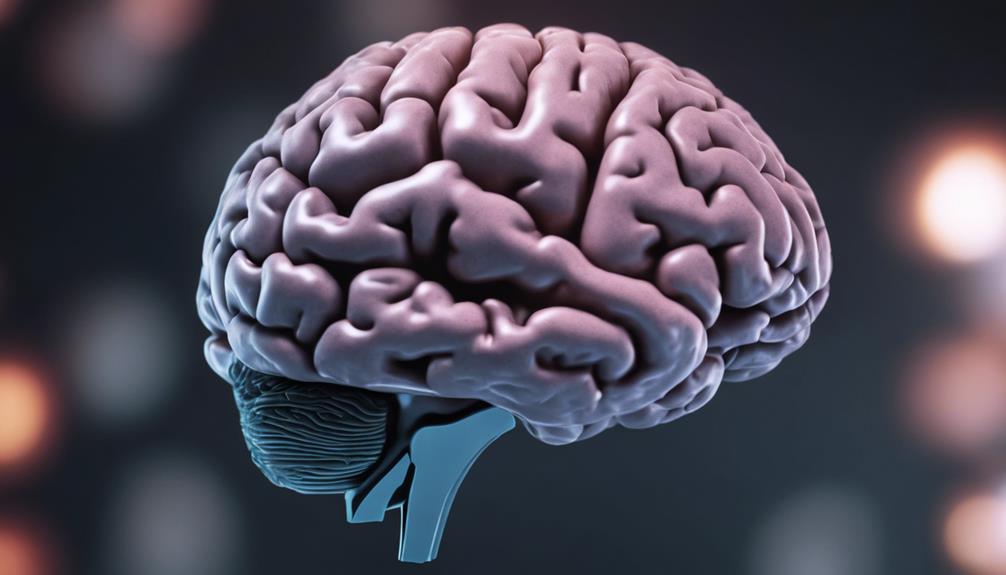
Brain tumors have the potential to bring about shifts in personality, disrupt cognitive functions, and present challenges in emotional regulation. These changes can manifest in alterations in empathy, decision-making processes, and social interactions.
Understanding how tumors impact behavior is essential for distinguishing medical causes from psychological conditions like narcissistic personality disorder.
Tumor-Induced Personality Changes
Tumor-induced personality changes can greatly alter an individual's behavior and emotional responses. Brain tumors have the potential to disrupt one's typical ways of thinking and interacting with the world. These changes may include heightened impulsivity or a decline in empathy, resembling characteristics seen in narcissistic personality disorder.
The impact of brain tumors on behavior varies based on factors like tumor size and location within the brain. It's essential to recognize these alterations to distinguish them from underlying personality disorders.
Cognitive Function Disruptions
Understanding how cognitive function disruptions caused by brain tumors impact behavior is essential in diagnosing and treating individuals with narcissistic personality disorder.
- Cognitive deficits resulting from brain tumors can manifest as changes in empathy, emotional regulation, and social interactions in individuals with narcissistic personality disorder.
- Tumors affecting specific brain regions may exacerbate existing narcissistic traits or mask symptoms of the disorder, complicating accurate diagnosis and treatment.
- The location and size of brain tumors greatly influence the extent of cognitive and behavioral disruptions in individuals with narcissistic personality disorder, underscoring the importance of thorough assessment and tailored interventions for best outcomes.
Emotional Regulation Challenges
Experiencing emotional regulation challenges due to the impact of brain tumors on behavior can greatly alter the demeanor of individuals with Narcissistic Personality Disorder (NPD). In these cases, tumors affecting specific areas of the brain can exacerbate emotional dysregulation, leading to significant behavioral changes in NPD patients.
The presence of tumors can intensify narcissistic traits such as a lack of empathy and increased self-centeredness. Understanding how brain tumors influence emotional regulation in individuals with NPD is vital for developing effective treatment strategies.
Personality Changes From Brain Tumors

Brain tumors can lead to significant changes in an individual's personality by affecting key areas of the brain responsible for emotions and behavior. These changes may manifest as symptoms akin to narcissistic personality traits.
Here are three key points to ponder about personality changes from brain tumors:
- Increased Self-Centeredness: Tumors in areas like the frontal lobe can trigger a shift towards heightened self-centered behavior. Individuals may become excessively focused on their own needs and desires, often at the expense of others.
- Lack of Empathy: Damage to brain regions involved in empathy, such as the limbic system, can result in a diminished ability to understand or share the feelings of others. This can lead to a noticeable decline in compassionate responses.
- Impulsivity: Brain tumors impacting the temporal lobe may contribute to impulsivity, causing individuals to act without thoughtful consideration of consequences. This impulsiveness can lead to risky decision-making and erratic behaviors.
Brain Regions Affected by Tumors
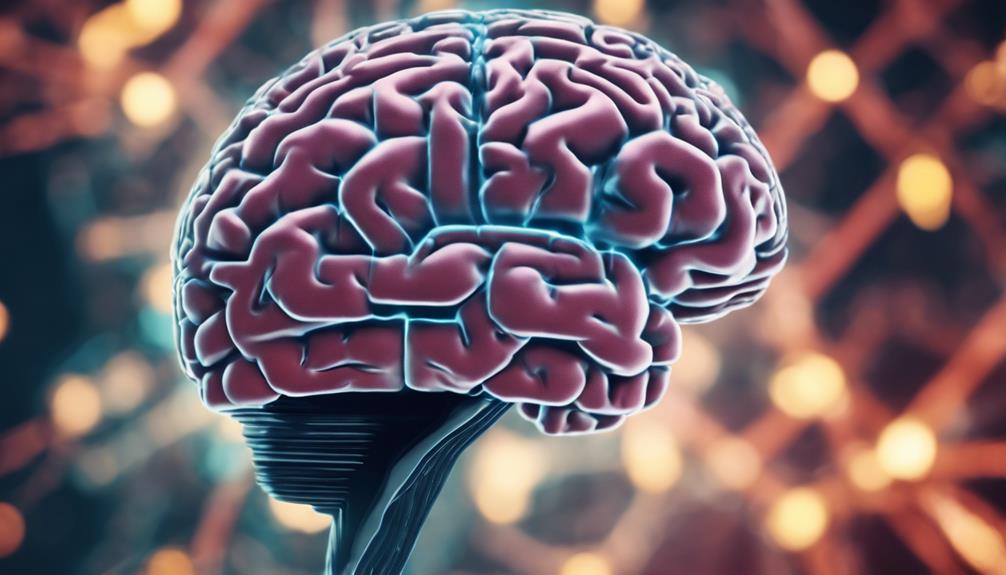
In the intricate network of the brain, tumors can infiltrate and disrupt key regions responsible for empathy and emotional processing. The cerebral cortex, known for its role in higher brain functions, can be affected by these tumors, leading to challenges in understanding and sharing others' feelings. Specifically, tumors in the frontal cortex, insular region, and prefrontal areas can impact empathy and self-awareness, contributing to the development or exacerbation of narcissistic traits.
These structural abnormalities caused by brain tumors can result in deficits in emotional regulation and compassion processing. When tumors invade these empathy-related brain regions, they disrupt normal brain functioning, influencing how individuals perceive and respond to emotions. Understanding the intricate connections between brain structure and empathy is crucial for tailored treatments for those with narcissistic personality disorder. By targeting these affected regions, healthcare professionals can potentially alleviate some of the emotional challenges faced by individuals dealing with both brain tumors and narcissistic traits.
Influence on Emotional Regulation

Our research reveals a direct correlation between structural abnormalities in empathy-related brain regions and deficits in emotional regulation observed in individuals with narcissistic personality disorder. When examining the influence on emotional regulation in these individuals, we find the following key points:
- Empathy Deficit: Individuals with narcissistic personality disorder often exhibit a lack of empathy, which can be linked to reduced thickness in specific brain areas associated with compassion processing.
- Brain Structure: Structural abnormalities in the cerebral cortex, particularly in regions related to empathy, contribute to the emotional regulation deficits seen in narcissistic patients.
- Functional Imaging Techniques: Researchers are utilizing advanced methods like functional magnetic resonance imaging (fMRI) to investigate the brain function of individuals with narcissistic personality disorder. These techniques help in understanding how structural deficits impact emotional regulation and empathy in these individuals.
Through a deeper understanding of the brain structure and function in individuals with narcissistic personality disorder, we aim to develop more effective treatment strategies and interventions to address the emotional regulation challenges faced by these individuals.
Behavioral Shifts and Tumor Presence
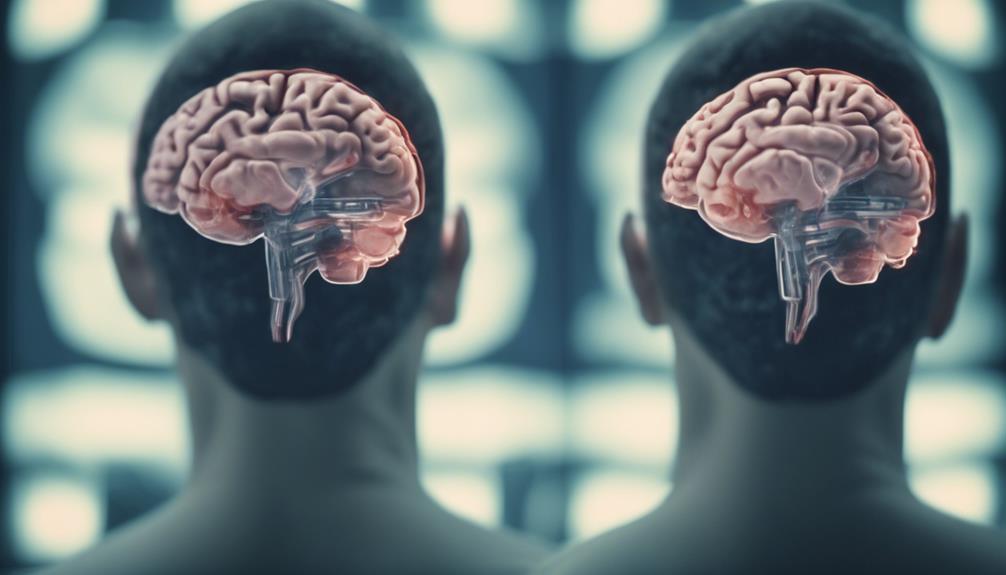
Brain tumors can trigger behavioral shifts that resemble traits of narcissistic personality disorder. These changes may include a lack of empathy and self-centered behavior.
Understanding how tumors impact social behavior is essential in distinguishing between true narcissistic tendencies and tumor-induced alterations.
Personality Changes With Tumors
A correlation exists between the presence of brain tumors and shifts in behavior, particularly in relation to the emergence of narcissistic personality traits.
- Tumor location in specific brain regions can influence empathy levels.
- Changes in brain structure due to tumors might lead to self-centered behaviors.
- Studies suggest a link between tumor size and the development of narcissistic traits.
Understanding how brain tumors affect personality is essential in recognizing and addressing the emergence of narcissistic traits in individuals. The alterations in emotional regulation, empathy, and self-awareness can mimic narcissistic behaviors, emphasizing the importance of early detection and intervention to mitigate the impact on personal relationships and overall well-being.
Impact on Social Behavior
Understanding the correlation between brain tumors and behavioral shifts is essential in recognizing the impact on social behavior, particularly in relation to empathy levels and narcissistic traits. Behavioral changes in individuals with brain tumors can profoundly influence how they interact with others.
The presence of brain tumors may affect brain regions responsible for empathy, potentially leading to a decrease in empathy levels. Additionally, studies suggest that specific locations of brain tumors could be linked to the emergence of narcissistic behaviors. This highlights the intricate relationship between neurological factors and personality traits.
Changes in emotional regulation and social cognition due to brain tumors can play a role in the development or intensification of narcissistic personality traits. Recognizing these dynamics is important for providing thorough care and support to individuals facing these challenges.
Cognitive Effects of Brain Tumors

Exploring the cognitive impacts of brain tumors reveals significant changes in personality, behavior, and emotional regulation.
- Tumors situated in areas like the frontal lobe, responsible for executive functions, can influence decision-making abilities and social interactions.
- When the insular region, associated with empathy, is affected by tumors, it can result in alterations in emotional processing and interpersonal relationships.
- Symptoms akin to narcissistic personality traits may manifest in individuals with brain tumors due to disruptions in brain function.
Understanding these cognitive effects is important in distinguishing between neurological changes caused by the tumor and underlying personality disorders such as narcissistic personality disorder. By recognizing and addressing these cognitive impacts, healthcare professionals can provide more tailored care and support to individuals dealing with the complex interplay between brain tumors and their cognitive functioning.
Understanding Narcissistic Traits
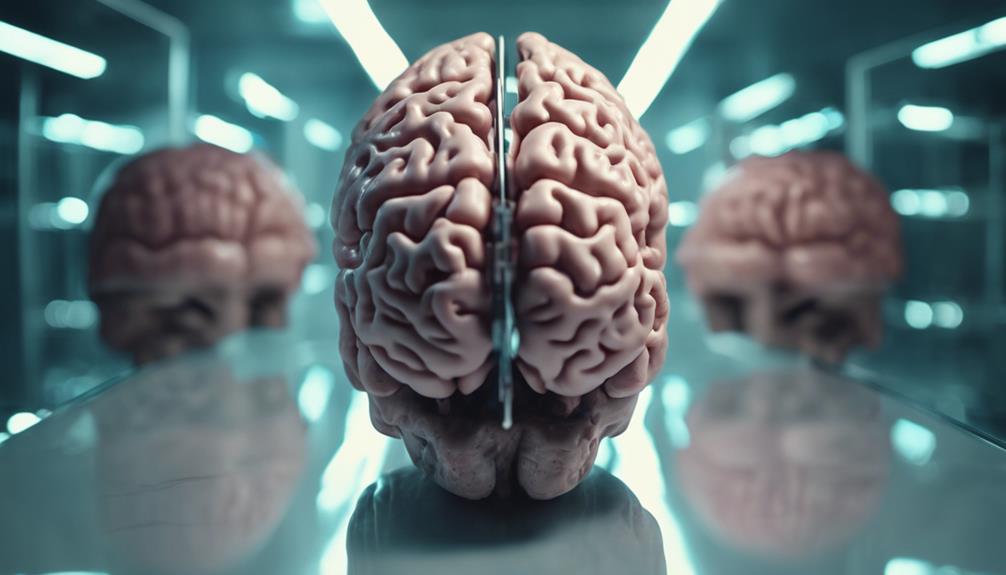
Narcissistic traits encompass deficits in emotional regulation, lack of empathy, and a strong self-focus. Individuals with Narcissistic Personality Disorder (NPD) often exhibit high levels of these characteristics, impacting their relationships and interactions. The lack of empathy can result in difficulties understanding or relating to the emotions of others, leading to challenges in forming meaningful connections. This self-centered focus can manifest as a constant need for admiration and validation, with little regard for the feelings of those around them.
People with NPD may struggle to regulate their emotions effectively, often experiencing intense mood swings or outbursts when their self-image is threatened. These traits can contribute to a sense of entitlement and a belief in one's superiority over others. Understanding these traits is vital in recognizing and addressing the complexities of NPD. By delving into the core features of this personality disorder, we can gain insights into the behaviors and thought patterns that define it.
Examining Brain Tumor Influence
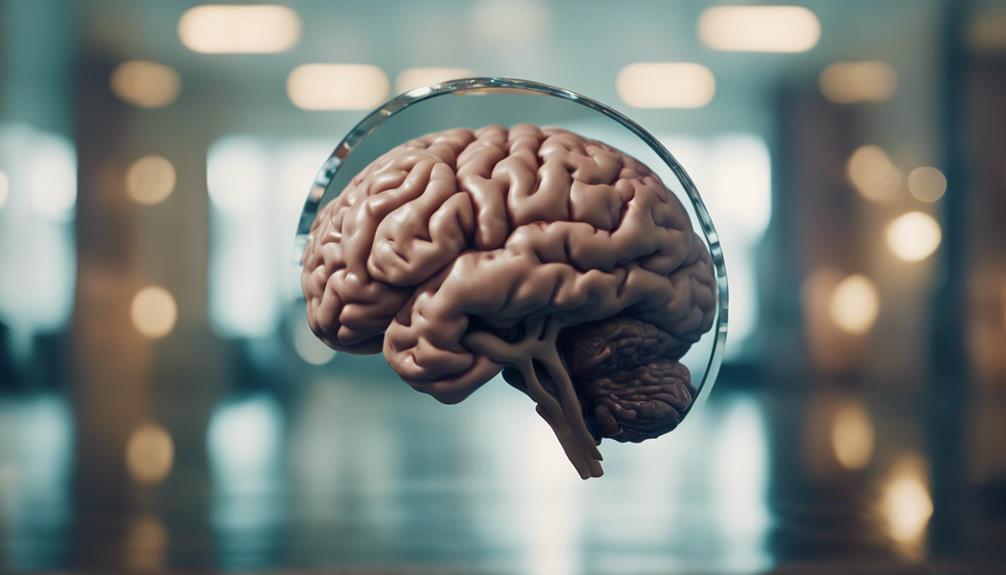
Research suggests a potential link between brain tumors and the development of Narcissistic Personality Disorder (NPD). When pondering the impact of brain tumors on NPD, it's vital to comprehend how these tumors can influence specific brain regions related to empathy, emotional regulation, and self-awareness.
Here are three key points to ponder:
- Brain Tumors and Empathy: Structural abnormalities caused by brain tumors might disrupt the neural circuits responsible for empathy, leading to deficits in understanding and sharing the feelings of others, a hallmark of NPD.
- Emotional Processing: Brain tumors can affect areas involved in emotional processing, potentially contributing to difficulties in regulating emotions and recognizing the emotions of others, which are common in individuals with NPD.
- Self-Awareness and NPD Traits: The presence of brain tumors may lead to alterations in self-awareness, influencing self-centered behaviors characteristic of NPD.
Understanding how brain tumors influence empathy and emotional regulation sheds light on the neurological underpinnings of NPD. Further research is essential to elucidate the intricate relationship between brain tumors, brain structure changes, and the development of narcissistic traits.
Research Gaps in NPD and Tumors
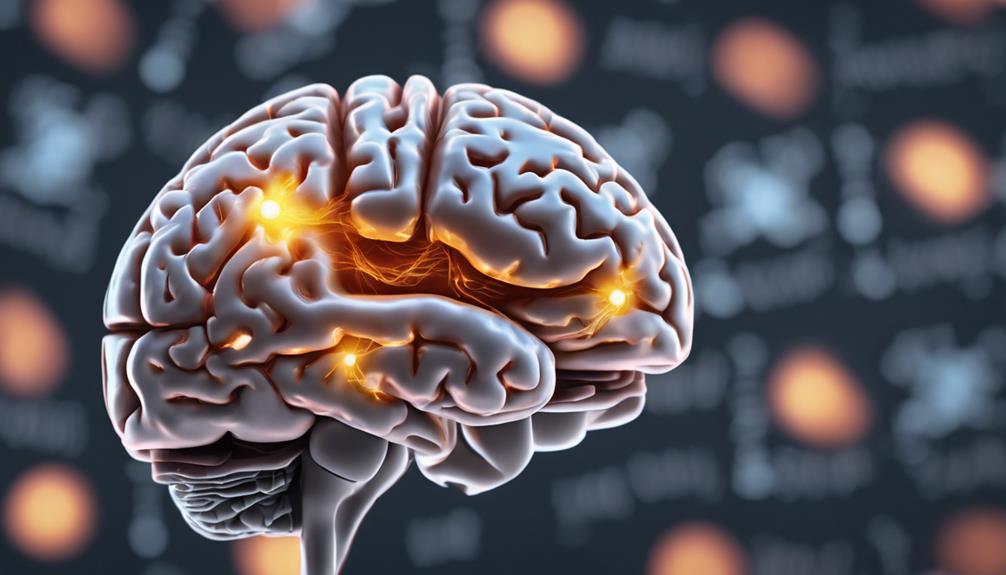
Limited research has been conducted on the direct connection between brain tumors and Narcissistic Personality Disorder (NPD). More studies are needed to fully grasp the potential relationship between these two factors.
The existing gaps in research impede a thorough understanding of how brain tumors might impact the development or manifestation of NPD.
NPD Symptoms and Tumors
Investigating the potential relationship between brain tumors and symptoms of Narcissistic Personality Disorder remains a crucial area for further exploration.
- Limited research has explored the connection between neurological implications of brain tumors and NPD symptoms.
- Understanding how brain tumors may impact cognitive functions and manifest NPD traits is vital for a thorough understanding.
- There's a significant research gap in elucidating the intricate interactions between brain tumors and the development or exacerbation of NPD symptoms.
This examination could shed light on whether brain tumors play a role in the manifestation of NPD traits, potentially paving the way for improved diagnostic and therapeutic strategies for individuals affected by both conditions.
Diagnostic Challenges in NPD
Exploring the diagnostic landscape of Narcissistic Personality Disorder presents a challenge exacerbated by the limited investigation of its potential association with brain tumors. The lack of thorough data hinders the identification of specific patterns or correlations between brain tumors and NPD, leading to diagnostic challenges in clinical settings. To address these gaps, further research is essential to understand the possible biological mechanisms or shared pathways between brain tumors and NPD. This deeper exploration will enable a more detailed understanding of the complex interplay between these two conditions. Below is a table highlighting the key diagnostic challenges in NPD and brain tumors:
| Diagnostic Challenges | NPD | Brain Tumors |
|---|---|---|
| Limited Studies | ✓ | ✓ |
| Lack of Data | ✓ | ✓ |
| Need for Research | ✓ | ✓ |
Frequently Asked Questions
What Part of the Brain Is Affected by Narcissistic Personality Disorder?
When considering Narcissistic Personality Disorder, it's crucial to recognize the impact it has on the brain. Structural abnormalities can be observed in the cortex, particularly in regions linked to empathy. Reduced thickness in areas responsible for processing compassion is common in individuals with narcissism.
Additionally, the insular region, associated with empathy, shows correlations between gray matter volume and empathy deficits in these patients. MRI studies further reveal significant alterations in brain regions related to empathy in those with Narcissistic Personality Disorder.
Can a Brain Tumor Cause Personality Disorder?
Yes, a brain tumor can cause changes in behavior and personality, potentially leading to the development of a personality disorder like Narcissistic Personality Disorder. Tumors affecting brain regions involved in empathy and emotional processing may contribute to narcissistic traits.
Structural abnormalities due to tumors can impact empathy and compassion, exacerbating narcissistic behaviors. Understanding these neurological implications sheds light on the brain's role in personality disorders.
What Is the Root of Narcissism?
When delving into the root of narcissism, it's essential to explore the intricate workings of the brain. Structural abnormalities in specific brain regions have been linked to the empathy deficits seen in individuals with narcissistic personality disorder.
Brain imaging studies reveal correlations between gray matter volume in certain areas and empathy deficits, shedding light on the neurological underpinnings of narcissism.
Understanding these brain structures can pave the way for more effective treatment strategies.
At What Age Does Narcissistic Personality Disorder Develop?
Narcissistic Personality Disorder typically begins to develop in late teenage or early adult years. Diagnosis of NPD requires evidence of narcissistic traits dating back to that period.
At least five regular narcissistic behaviors are necessary for a diagnosis. The pattern of behavior must cause distress or impairment in various life areas. Detecting strong indications of narcissistic behavior during youth is vital for diagnosing NPD.
Conclusion
In summary, while the link between brain tumors and narcissistic personality disorder may seem like a far-fetched idea, research suggests that there could be a connection worth exploring. Understanding the impact of tumors on behavior and personality changes is vital in addressing the complex nature of NPD.
Further research is needed to fill in the gaps and shed light on this intriguing relationship. So, next time you meet a narcissist, just remember, it might be their brain talking!
Chris brings a wealth of knowledge and personal experience to the role of Expert Author. With a focus on narcissistic personality disorder and recovery processes, Chris’s articles offer a mix of expert analysis, personal anecdotes, and actionable advice. Their work enriches our platform with depth, authenticity, and a perspective that resonates with those who have experienced narcissism firsthand.











